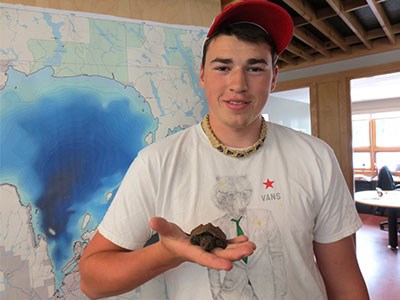Wahnapitae First Nation has taken a proactive approach to promote environmental sustainability in its dealings with mining companies like Vale, Glencore and KGHM.
Since the early 1990s, the First Nation, located northeast of Sudbury, has worked to develop relationships with mining industry partners.
Cheryl Recollet, Wahnapitae First Nation's environmental coordinator, said her department has developed in-house capacity over the past 15 years to conduct environmental assessments for mining companies who work near their reserve boundaries.
In 2012, Wahnapitae First Nation's sustainable development department founded Tahgaiwinini Technical and Environmental Services Group.
The company has four technicians and two advisers on staff, who provide mining companies with a variety of environmental management services.
The technicians are trained to use geographical information systems to map the low of groundwater, plumes of air pollution, and provide information on the First Nation's territory, species at risk, and traditional hunting territory.
Some First Nations are anti-development, while others are more supportive of industry. Recollet said the Wahnapitae First Nation falls somewhere in between both extremes.
“We're always planning for seven generations into the future,” she said. “What are we leaving behind for them?” That stance has meant Tahgaiwinini Technical must often perform a balancing act, and carefully measure the benefits of future development against the impact on the environment and First Nation community.
Ideally, a project should impact the surrounding environment as little as possible, Recollet said. If there is an impact, Tahgaiwinini Technical would look for ways to mitigate it as much as possible, and help make a plan to remediate the area to its original state after the mining project has ended.
In some cases, Recollet said, Tahgaiwinini Technical's mission to promote environmental sustainability trumps potential economic growth.
“Just because we're actively engaged in the process, it doesn't necessarily mean we're supportive of the project,” she said. “It's not always sunshine and roses.” But through a long process the First Nation has fostered working relationships with the region's largest mining companies.
Tahgaiwinini Technical has also fostered relationships with local stakeholders, such as Laurentian University's Living with Lakes Centre, which has provided them with technical expertise.
In turn, Wahnapitae First Nation has given guidance to other First Nations in the area to help them improve their relations with industry, and take a similar proactive approach with development near or on their territories.
“We've been at the game a little bit longer than some of the others,” Recollet said. Tahgaiwinini Technical is funded by Wahnapitae First Nation's sustainable development department. While the bandowned company has generated revenues through its contracts with mining companies, Recollet said they have not yet been enough to sustain the business on their own. The next step, she said, is to gain more contracts so the business can be selfsustainable, and eventually work independently from the First Nation's sustainable development department.




